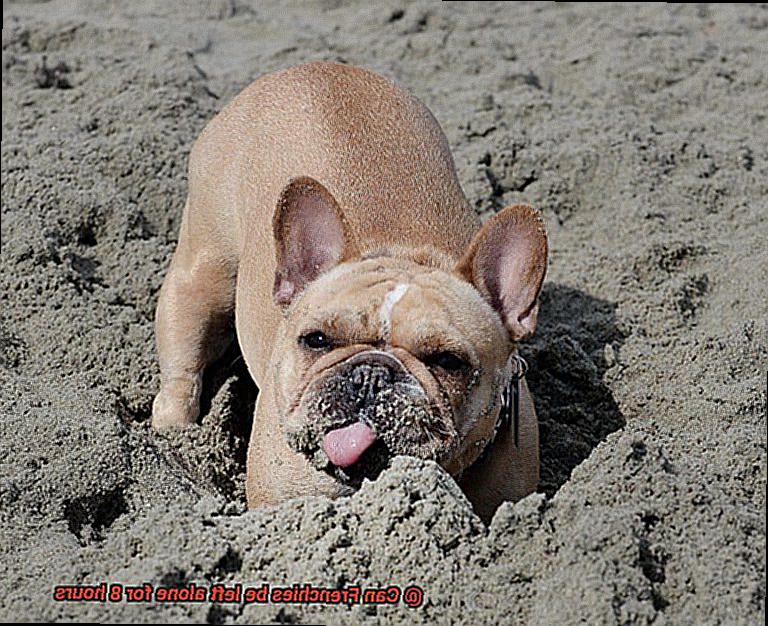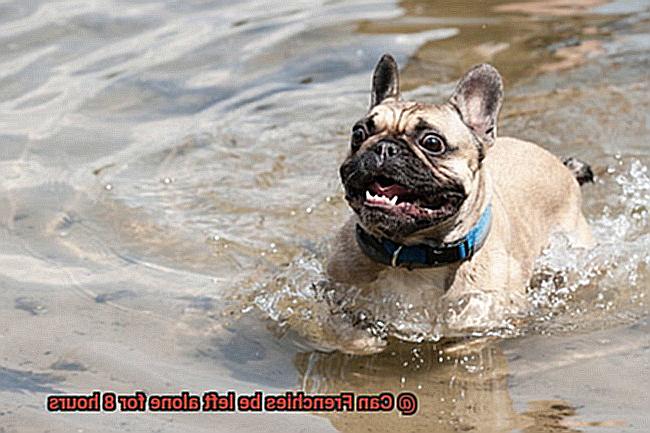Can Frenchies be left alone for 8 hours?
The French Bulldog – a breed that could melt even the iciest of hearts with its irresistible charm and unwavering affection. But here’s the thing: can these lovable little creatures handle being left alone for a solid 8 hours? That’s the million-dollar question on every Frenchie owner’s mind.
In this blog post, we’re diving headfirst into the topic of whether your furry friend can endure those long stretches of solitude. We’ll dig deep into their temperament, exercise needs, and overall well-being to give you an all-encompassing understanding of what leaving a Frenchie alone really means.
Now, hold your horses – or in this case, your Frenchies – because not all dogs are cut from the same cloth. Each breed comes with its own set of quirks and demands. So whether you’re already a proud Frenchie parent or just contemplating bringing one into your life, buckle up and prepare to unveil the truth about leaving these four-legged companions to fend for themselves for an extended period of time.
The Sociable Nature of French Bulldogs
Contents
- 1 The Sociable Nature of French Bulldogs
- 2 Is It Recommended to Leave Frenchies Alone for 8 Hours?
- 3 Gradually Acclimating Frenchies to Being Alone
- 4 Providing a Comfortable and Secure Environment for the Frenchie
- 5 Hiring a Dog Walker or Pet Sitter
- 6 Crate Training as a Tool to Help Frenchies Feel Secure
- 7 Exercise Before and After Being Left Alone
- 8 Seeking Professional Guidance from a Veterinarian or Dog Behaviorist
- 9 Conclusion
French Bulldogs, also known as Frenchies, are beloved for their sociable nature and their love for human companionship. However, their sociability can pose challenges when it comes to leaving them alone for extended periods. In this article, we will explore the sociable nature of French Bulldogs and discuss their ability to be left alone for 8 hours a day.
The Sociable Nature of French Bulldogs:
French Bulldogs are renowned for their affectionate and friendly personalities. They thrive on human interaction and form strong bonds with their owners. These lovable dogs enjoy being part of a family and crave constant attention.
Separation Anxiety in French Bulldogs:
Due to their sociable nature, French Bulldogs are prone to separation anxiety. When left alone for long periods, they can exhibit destructive behaviors such as chewing furniture, excessive barking, or having accidents indoors. These behaviors stem from their distress and longing for human company.
Mitigating Separation Anxiety:
While it is generally not ideal to leave Frenchies alone for 8 hours, there are steps you can take to alleviate their anxiety. Providing them with a comfortable and secure space, such as a crate or designated area, can help them feel safe. Engaging toys and puzzle feeders can also keep them mentally stimulated during your absence.
Additional Support:
If leaving your Frenchie alone for 8 hours is unavoidable, consider enlisting the help of a dog walker or pet sitter. They can provide social interaction and break up the long period of solitude. Alternatively, having someone from your household or a trusted individual spend time with your Frenchie during the day can also be beneficial.
Is It Recommended to Leave Frenchies Alone for 8 Hours?
French Bulldogs, or Frenchies as they are affectionately called, are known for their loving and sociable nature. They form deep bonds with their owners and thrive on human companionship. However, leaving any dog alone for long periods of time can have negative effects on their well-being, including separation anxiety and behavioral issues. This is especially true for French Bulldogs, who are prone to separation anxiety due to their strong attachment to their owners.
So, is it recommended to leave Frenchies alone for 8 hours? The short answer is no. This duration of time is considered too long for them to be without human interaction and mental stimulation. Imagine being cooped up in a room all day without any social interaction – it would drive anyone nuts. Frenchies are no different. They can become anxious, stressed, and even destructive when left alone for extended periods.
However, every dog is unique and some Frenchies may be able to tolerate being alone for a few hours without experiencing significant distress. It’s important to gradually train and acclimate your Frenchie to being alone for short periods before leaving them for 8 hours straight. Start by leaving them alone for 15 minutes and gradually increase the time over several weeks. This can help them develop coping mechanisms and reduce anxiety.
In addition to training, it’s crucial to provide your Frenchie with plenty of exercise and mental stimulation before leaving them alone. A tired Frenchie is a happy Frenchie. Exercising them before you leave can help alleviate boredom and anxiety. Take them for a long walk, play fetch in the backyard, or engage them in interactive puzzle toys to keep their minds occupied.
If you find yourself needing to be away from home for longer periods, consider hiring a dog walker or pet sitter to check on your Frenchie during the day. A quick visit from a trusted professional can provide much-needed companionship and exercise while you’re away.
Alternatively, if you work full-time and cannot spend enough time with your Frenchie during the day, it might be worth considering doggy daycare or enlisting the help of a trusted family member or friend. These options allow your Frenchie to socialize and interact with other dogs, providing mental stimulation and preventing loneliness.
Gradually Acclimating Frenchies to Being Alone
French Bulldogs, or Frenchies as they are affectionately known, are sociable and affectionate dogs that often form strong bonds with their owners. However, they can also experience separation anxiety when left alone for extended periods of time. In this section, we will explore the process of gradually acclimating Frenchies to being alone in order to prevent or minimize separation anxiety.
Start Early:
Ideally, the process of acclimating Frenchies to being alone should start from a young age, when they are still puppies. However, it is also possible to acclimate adult dogs to being alone with patience and consistency.
Short Periods of Alone Time:
Begin by leaving your Frenchie alone for short periods of time, starting with just a few minutes and gradually increasing the duration over time. This will help them get used to the idea of being alone and build their confidence.

Create a Safe Space:
When you are not at home, it is important to create a safe and comfortable space for your Frenchie. This can be a designated area in your house where they have access to water, toys, and a comfortable bed. Make sure this space is secure and free from any potential hazards.
Provide Mental Stimulation:
To prevent boredom and keep your Frenchie occupied when they are alone, provide them with mental stimulation. This can include puzzle toys, interactive feeders, or leaving the TV or radio on to provide some background noise.
Obedience Training and Socialization:
Consider enrolling your Frenchie in obedience training or socialization classes. This can help them develop better coping mechanisms and increase their confidence when faced with being alone.
Increase Time Gradually:
Gradually increase the time you spend away from your Frenchie, but also make sure to spend quality time with them when you are home. This will help reinforce the idea that being alone is not a negative experience and that they will always have your attention and affection.
Seek Professional Help:
If your Frenchie continues to struggle with being alone, even after gradual acclimation, it may be beneficial to seek professional help from a veterinarian or animal behaviorist. They can provide additional guidance and support specific to your Frenchie’s needs.
Providing a Comfortable and Secure Environment for the Frenchie
Leaving our furry friends alone for extended periods can tug at our heartstrings, especially when it comes to French bulldogs. These lovable little clowns thrive on companionship and affection. However, with the right planning and environment, we can help them feel comfortable and secure while we’re away. In this guide, we’ll explore some expert tips on providing a cozy haven for your Frenchie when they’re home alone for 8 hours.
Designate a Safe Space:
Ensure your Frenchie has a designated area where they can retreat to and feel secure. This could be a crate, a specific room, or a gated-off area. Remove any potential hazards or items that your pup may chew on and potentially choke on.
Stimulate Their Minds:
Keep boredom at bay by providing plenty of toys and activities. Interactive toys, puzzle toys, and chew toys are fantastic for keeping those curious minds occupied. Rotate the toys regularly to maintain their interest and prevent boredom.
Background Noise:
Consider leaving some soft background noise, like soothing music or a television show, to help mask outside noises that may cause anxiety. This can also provide a sense of company for your Frenchie, making them feel less alone.
Hydration Station:
Ensure your Frenchie has access to fresh water at all times. Spill-proof water bowls or water fountains can prevent accidents and keep your pup hydrated throughout the day.
Arrange for Check-Ins:
If possible, arrange for someone trustworthy to check in on your Frenchie during the day. This could be a friend, family member, or even a professional pet sitter. A friendly face can provide much-needed human interaction and break up the solitude of long hours.
Pre-Departure Exercise:

Before leaving your Frenchie alone, make sure they’ve had ample exercise and mental stimulation. A tired dog is more likely to rest peacefully while you’re away.
Hiring a Dog Walker or Pet Sitter
This can be distressing for both you and your Frenchie, as these sociable and affectionate dogs can experience separation anxiety. That’s why hiring a dog walker or pet sitter can be a game-changer for ensuring the well-being of your beloved French Bulldog.
Exercise Needs:
French Bulldogs have moderate exercise needs, and regular physical activity is crucial for their health. Hiring a dog walker ensures that your Frenchie gets the exercise they need to maintain a healthy weight and prevent obesity-related issues. A professional dog walker can take them on walks, play with them in the park, or engage them in other activities tailored to their energy levels.
Alleviating Separation Anxiety:
Leaving your Frenchie alone for 8 hours or more can trigger separation anxiety, leading to destructive behaviors or excessive barking. A pet sitter can provide companionship and mental stimulation during your absence. Engaging in interactive play, offering puzzle toys, and providing general care such as feeding and grooming can help alleviate separation anxiety and keep your Frenchie happy and calm.
Choosing the Right Dog Walker or Pet Sitter:
When entrusting someone with the care of your French Bulldog, it’s crucial to select a reliable and trustworthy individual or service. Seek recommendations from friends or family who have used these services before. During the interview process, ask about their experience with French Bulldogs and how they handle separation anxiety issues. Checking references and ensuring they have insurance gives you peace of mind.
Complementing Your Own Interaction:
While a dog walker or pet sitter can provide essential care and attention, it’s essential to remember that no amount of outside help can replace the love and time you spend with your Frenchie. Dedicate quality time to play, train, and bond with your furry friend outside of the hours they are home alone.
Crate Training as a Tool to Help Frenchies Feel Secure
French Bulldogs are known for their sociable and affectionate nature. They thrive on companionship and can become anxious when left alone for long periods. This separation anxiety can lead to destructive behaviors and excessive barking, causing distress for both you and your Frenchie. But fear not, because crate training can be a valuable tool in helping your Frenchie feel secure when left alone for 8 hours.
Introducing crate training from a young age is key to creating a safe and secure space for your Frenchie. The crate should be appropriately sized, allowing them to stand up, turn around, and lie down comfortably. By providing them with a confined area, you are giving them a den-like environment where they can feel protected.
Making the crate a positive and inviting space is crucial. Use treats, toys, and blankets to create a cozy atmosphere inside the crate. By associating these items with the crate, your Frenchie will begin to view it as their own personal sanctuary.
Gradual acclimation is essential when crate training. Start with short periods of time in the crate and gradually increase the duration. This helps your Frenchie build confidence and trust in the crate as they realize that being alone doesn’t always mean something negative.
To establish a routine and reinforce positive behavior, use a command or cue word when entering and exiting the crate. This helps your Frenchie understand what is expected of them and adds structure to their crate training.
Boredom and anxiety can also contribute to your Frenchie’s discomfort when left alone. Providing mental stimulation inside the crate can help alleviate these issues. Puzzle toys or frozen treats can keep their minds occupied and provide a positive distraction while you’re away.
It’s important to note that the crate should never be used as a form of punishment. It should always be seen as a safe haven for your Frenchie. Using the crate as a punishment can create negative associations and hinder the effectiveness of crate training.
While crate training can provide security for your Frenchie, it’s also crucial to ensure they receive regular exercise and mental stimulation outside of crate time. This helps them remain happy and content overall.
Exercise Before and After Being Left Alone
By following these guidelines, you can help prevent destructive behavior, reduce separation anxiety, and ensure your furry friend remains content while you’re away.
Preparing for Departure:
Before leaving your Frenchie alone, it’s crucial to provide them with ample exercise to tire them out physically and mentally. Here are some effective exercise ideas:
- Long Walks: Take your Frenchie for a brisk walk, allowing them to explore their surroundings and burn off energy.
- Interactive Toys: Engage your pup with puzzle toys that challenge their mind and keep them occupied.
- Mental Stimulation: Teach them new tricks or practice obedience training, which not only tires them mentally but also strengthens your bond.
Preventing Boredom:
To combat separation anxiety and boredom, consider the following:
- Interactive Toys: Leave your Frenchie with toys that dispense treats or hide food inside. This will keep them entertained and mentally stimulated.
- Background Noise: Leave the TV or radio on at a low volume to provide a sense of company and reduce feelings of loneliness.
Post-Departure Activities:
After returning home, it’s essential to engage your Frenchie in physical activity to release any pent-up energy. Here’s what you can do:
- Playtime: Spend quality time playing with your pup, engaging in games like fetch or tug-of-war.
- Another Walk: Take your Frenchie for a walk to help them unwind and release any remaining energy.
Heat Safety:
As brachycephalic breeds, French Bulldogs are more prone to heat exhaustion. To ensure their safety during exercise:
- Avoid Excessive Exercise: Limit intense physical activity in hot or humid weather conditions.
- Hydration: Always provide fresh water for your Frenchie during and after exercise.
- Cool Environment: Create a comfortable, cool space for your pup to relax in after exercise.
Seeking Professional Guidance from a Veterinarian or Dog Behaviorist
When it comes to leaving Frenchies alone for 8 hours, it is important to consult with a veterinarian or dog behaviorist who specializes in this breed. These professionals have the expertise and experience to provide valuable insights and guidance on how to ensure the well-being of your Frenchie during your absence.

The Importance of a Veterinarian’s Expertise
A veterinarian can assess whether your Frenchie is physically ready to be left alone for 8 hours. Factors such as age, health condition, and overall temperament play a crucial role in determining their ability to tolerate being alone. Your veterinarian can provide advice on any necessary adjustments to their diet or medication schedule, as well as suggest appropriate exercise routines to keep them physically and mentally stimulated.
Understanding the Emotional and Behavioral Aspects
A dog behaviorist specializes in understanding the emotional and behavioral aspects of dogs, including separation anxiety. French Bulldogs are known for their affectionate nature, and they may experience stress or anxiety when left alone for an extended period. A behaviorist can help identify signs of separation anxiety and create a customized training plan to gradually acclimate your Frenchie to being alone, ensuring their comfort and well-being.
Tailored Solutions for Your Frenchie
Every Frenchie is unique, and their ability to tolerate being alone may vary. Consulting with professionals will help you understand your Frenchie’s individual needs and provide practical solutions tailored specifically to their temperament and personality. They can offer tips on creating a safe and enriching environment, recommend interactive toys or puzzles to keep them mentally engaged, and suggest techniques to help alleviate any potential anxiety.
Ensuring Informed Decision-Making
By seeking professional guidance, you can ensure that you are making informed decisions regarding leaving your Frenchie alone for 8 hours. Their expertise will minimize any potential risks associated with prolonged periods of solitude and help you create a safe and enriching environment for your beloved Frenchie.
PP49oLtdd3U” >
Conclusion
French Bulldogs, also known as Frenchies, are adorable and lovable companions. However, one question that often arises is whether they can be left alone for 8 hours. The answer to this question depends on various factors such as the individual dog’s temperament, age, and training.
While Frenchies are generally sociable dogs who enjoy human company, they can adapt to being alone for moderate periods of time. It is important to note that leaving any dog alone for extended periods can lead to feelings of loneliness and anxiety. French Bulldogs are no exception.
To ensure your Frenchie’s well-being when left alone for 8 hours, it is crucial to provide them with a stimulating environment. This can include leaving them with interactive toys or puzzles that keep their minds occupied. Additionally, setting up a designated area with comfortable bedding and access to water and food will help them feel secure during your absence.
Another key aspect is proper training. Teaching your Frenchie basic commands and gradually increasing the duration of their alone time can help build their independence and confidence. Crate training can also be beneficial in providing a safe space for your Frenchie while you’re away.
However, it’s essential to remember that every dog is unique, and some may struggle more than others with being left alone for long periods. If you notice signs of distress or destructive behavior in your Frenchie when left alone, it may be necessary to explore alternative solutions such as doggy daycare or hiring a pet sitter.
In conclusion, while French Bulldogs can adapt to being left alone for 8 hours with proper preparation and training, it is crucial to consider their individual needs and make adjustments accordingly.




